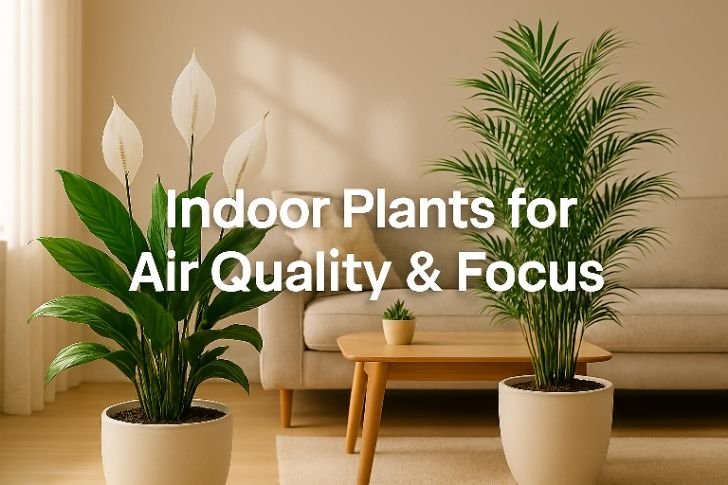
🌱 Introduction: Why Air Quality Matter Indoors
Air quality are something that most people ignore but it shape our health everyday. The invisible particles floating in your living room, your office or your bedroom, they effect not only your breathing but also your clarity of mind. Poor air quality makes you feel heavy, tired, and unmotivated, while fresh clean air can wake you up and bring focus like cold splash of water on face.
Indoor plants be one of the most underrated tools for improving air quality while also helping with mental focus. Their presence is not just decoration; it’s like brining a small forest into your home.
Many people think of air quality only when stepping outside into traffic or urban smog, but the truth is indoor air quality often worse than outdoor one. Dust, cleaning sprays, even new furniture can release harmful compounds that hang in the air like silent intruders. When you invite plants into your living space, you are not just decorating; you are slowly training the air to become your ally again.
Imagine the peace of waking up to the faint fragrance of crocus near your window, knowing your breathing is supported by natural filters working quietly day and night.
👉 Related: Daily Wellness Routine: 10 Steps to Start Feeling Better Now
🌿 The Science Behind Plants & Air Quality
Plants as Natural Air Filters
Indoor plants is like small green machines, absorbing carbon dioxide and throwing oxygen back into the space. But even more fascinating, many species like bamboo or peace lily can filter out toxins—chemicals that come from paint, cleaners, or even furniture glues.
People often search plant nursery near me without realizing they’re searching not just for décor but for a health upgrade.
NASA Clean Air Study
NASA research back in 1989 showed how plants reduce toxins like benzene and trichloroethylene. The famous study tested species like snake plant, bamboo palm, and lily of the valley. Even in closed-off spaces, these plants improve air quality dramatically.
Modern science keep showing that air quality indoors strongly affect concentration and energy. For example, studies from universities in Europe found that classrooms with more greenery recorded fewer complaints about headaches and fatigue. The moisture released by plants also reduce static electricity and dry skin, something that becomes noticeable in winter when heaters run constantly.
While air purifiers can trap dust with filters, indoor plants add a living balance—oxygen production, natural scent, and humidity control—all combined. Many people who type “plant nursery near me” are unknowingly searching for this balance, a quiet partnership between biology and design.
Connection to Mental Focus
Breathing cleaner air means the brain receive more oxygen. That directly improves memory, reduce mental fatigue, and helps you stay sharp during tasks. Offices with plants report better productivity and less stress. Imagine writing emails near a peace lily compared to a desk with no life—it feels totally different.
🌺 Best Indoor Plants for Air Quality & Focus
Snake Plant (Sansevieria)
Snake plant is low-maintenance, tough and a night-oxygen-releaser. People who put it in bedroom often report better sleep cycles. Its tall sword-like leaves also give modern look to interiors.
Snake plants are so resilient that even people who forget watering find them thriving. Their sharp lines fit minimalistic apartments, but their real gift is stabilizing air quality during the night. Unlike most plants, they release oxygen after dark, making them ideal sleep companions.
💡 Affiliate Suggestion: Top-rated Snake Plants on Amazon.
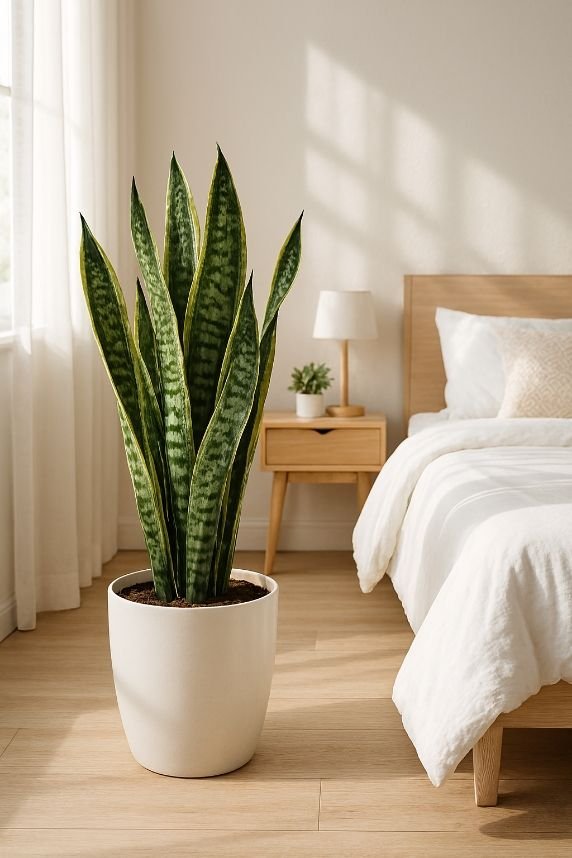
Peace Lily
Peace lily purify mold spores, boost humidity, and add soft white blossoms. Perfect for living rooms or bedrooms. With its glossy leaves, it’s not just good for air quality but also peace for the eyes.
Peace lilies also signal when they need water by gently drooping, so beginners rarely fail. Their broad green leaves trap dust and increase room humidity, which ease breathing issues.
💡 Affiliate Suggestion: Find Peace Lily on Amazon.
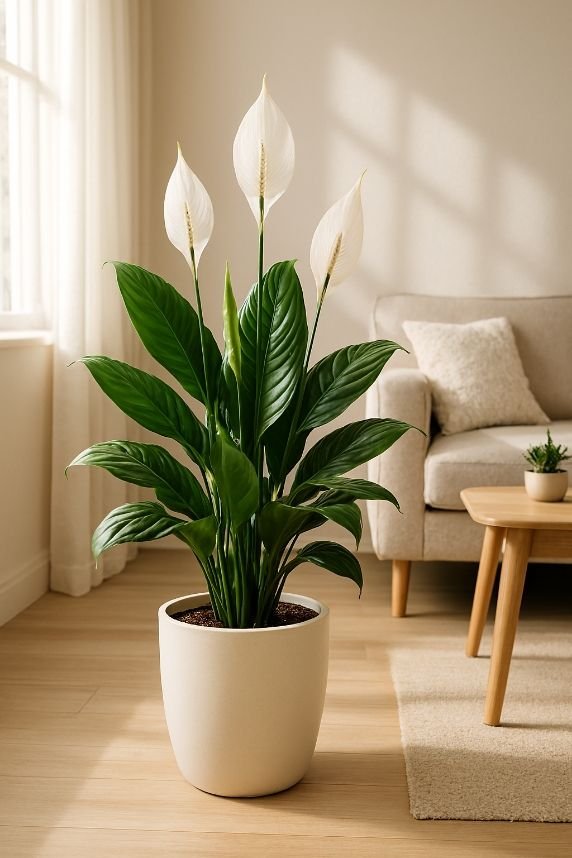
Bamboo Palm
The bamboo palm bring tropical vibes while filtering formaldehyde and xylene. It grows lush and wide, so it can fill empty corners beautifully. When people look for nursery near me, bamboo palm is usually one of the easy-to-grow plants available.
The bamboo palm grow tall but friendly, giving shade and acting like a soft indoor tree. Each leaf surface is a mini-filter for chemicals, and many nurseries recommend it as a starter tropical plant.
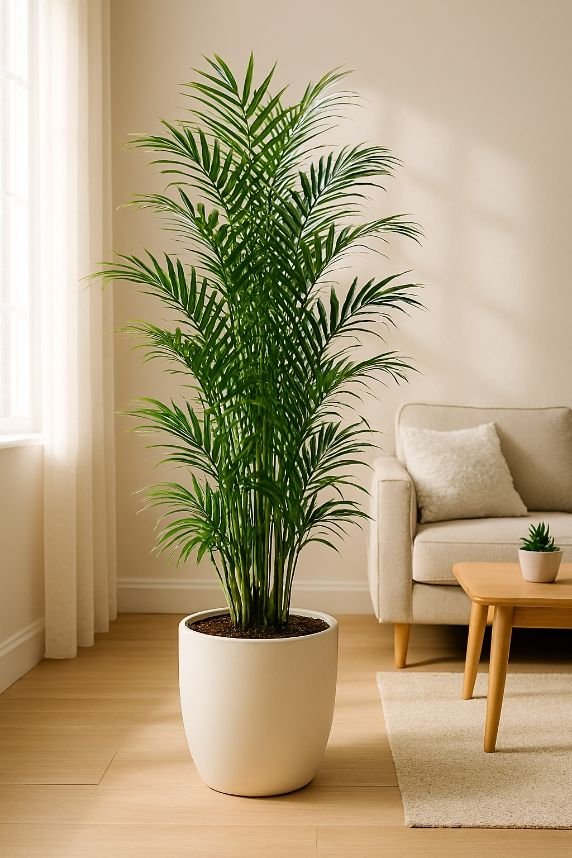
Lily of the Valley
Though commonly an outdoor plant, lily of the valley also works indoors with right care. Its bell-shaped flowers carry a gentle aroma that can lift mood, a natural way to enhance mental focus through smell.
Besides beauty, this plant teaches patience. It thrives in cooler spots, so placing it near shaded windows creates calming fragrance zones that uplift your spirit.
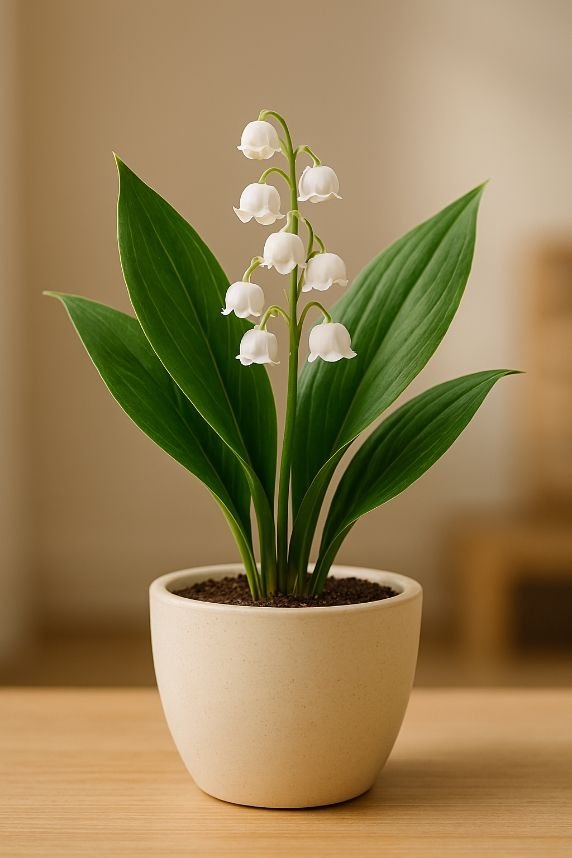
Crocus
Crocus flowers bloom in purple, yellow or white—bright splashes that instantly energize a room. The presence of color itself is a tool for focus and stress reduction. People underestimate how flowers can effect mental states.
The crocus bloom is seasonal but powerful—its sudden color burst feels like sunrise on your desk. Looking at these flowers during long work hours reminds you to pause, reset, and redirect focus.
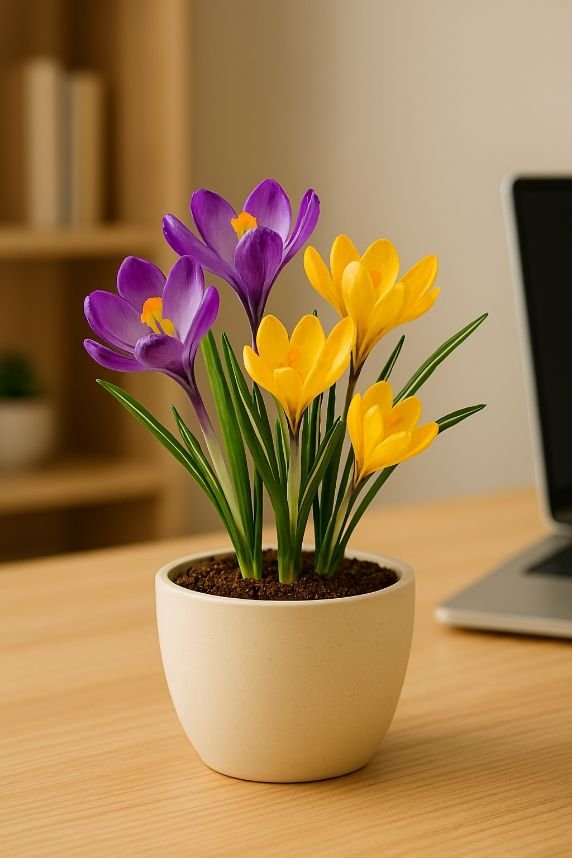
🌳 Going Bigger: Trees & Outdoor Wellness
Planting a tree is more than environmental act, it’s personal health strategy. Trees filter air pollution, regulate temperature, and increase oxygen levels around neighborhoods. If you don’t have space at home, supporting community projects where you can plant a tree still gives you sense of contribution.
💡 Tip: Type “plant nursery near me” into Google Maps and you’ll likely find local shops with bamboo saplings or small trees you can take home.

🧘 How Indoor Plants Improve Mental Focus
Biophilia Connection
Humans crave contact with nature. The biophilia effect means when we surround ourselves with greenery, our stress hormones lower and focus increase.
Visual calm from greens.
Fragrance boost from lilies or herbs.
Caring rituals like watering become grounding daily habits.
Think of your mind like a busy street—cars of thoughts rushing, honking, colliding. Plants act like green traffic lights, slowing down the chaos and letting ideas flow smoother. Research on workplace design revealed employees surrounded by plants reported up to 15% higher productivity.
This is not magic, it is biology: better oxygen levels, softer visual environment, and scents that trigger calm responses in the brain. Even small actions, like watering crocus while planning your day, create micro-breaks that reset attention.
When your body receives cleaner air and your eyes rest on natural patterns, the mental chatter quiets, and focus grows sharp like morning sunlight cutting through fog.
Daily Habits with Plants
Simple daily habits make huge difference. Reading near a peace lily, meditating beside a bamboo palm, or sipping tea while watching your crocus bloom—all of these turn ordinary moments into mindful rituals.
👉 Related: Daily Hydration Tips: Why Water Is Your Most Powerful Tool
🏡 Designing Your Indoor Plant Space
Where to Place Plants
Desk → Crocus or peace lily for calm.
Bedroom → Snake plant for night oxygen.
Living room → Bamboo palm for air freshness.
Kitchen → Small herbs like mint or basil for dual purpose.
Placement is more than decoration—it’s strategy for wellness. For example, setting a bamboo palm near the main entrance acts as both a natural greeter and a filter catching dust from shoes and coats. In bedrooms, snake plants positioned near the headboard refresh nighttime air quality while staying compact.
Kitchen corners brighten instantly with pots of herbs that double as cooking partners. To create a sanctuary vibe, group plants in threes: a tall bamboo palm, a medium peace lily, and a small crocus pot. This layering mimic nature’s rhythm and reduce empty “dead zones” in a room.
Next time you scroll “plant nursery near me” online, imagine not just one pot but a living arrangement that transforms your entire indoor atmosphere.
Plants + Tech
Nature can meet technology. Pairing greenery with air quality monitors let you see actual improvement over time. It’s motivating to see numbers improve while your home look more alive.
💡 Affiliate Suggestion: Smart Air Quality Monitors on Amazon.
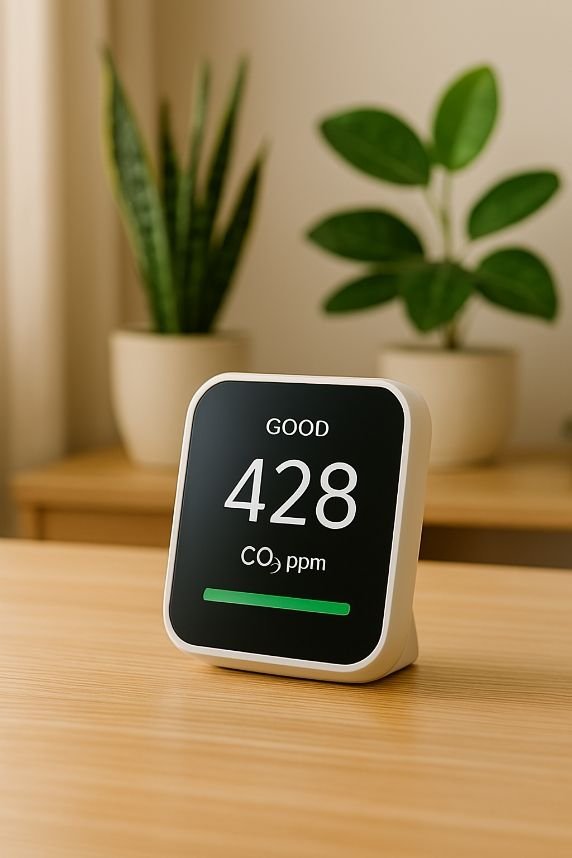
🌐 Links That Deepen Learning
Internal: Daily Wellness Routine: 10 Steps to Start Feeling Better Now.
Internal: Daily Hydration Tips: Why Water Is Your Most Powerful Tool.
External: NASA Clean Air Study Report.
🛒 CTA: Bring Nature Inside
Your mental focus and air quality don’t need to be complicated science experiments. They can be improved with one plant, one habit, one conscious decision.
🌱 Shop top picks today:
Snake Plant
Peace Lily
Air Quality Monitor
Choosing the right plant can feel overwhelming, but Amazon make it simple with curated collections. You can browse top-rated snake plants delivered directly to your door, or pick a peace lily already grown and ready to bloom.
Pair these with a smart air quality monitor and you will see numbers improve week after week. This combination of nature and technology gives you visible proof that your home environment is not only more beautiful, but also healthier. 🌱✨
🌟 Conclusion: Let Plants Heal the Air and the Mind
Indoor plants be not only decoration. They become living companions that filter unseen toxins and create an invisible harmony in your room. From the strong bamboo to the delicate lily of the valley, each plant is like a whisper from nature reminding you to breathe, to focus, and to slow down.
Think of each plant as a quiet guardian. The snake plant standing tall like a silent soldier, the peace lily offering softness and forgiveness, the crocus bursting with joy. Together they create a choreography of balance inside your walls.
Improving air quality is not a single action but an ongoing relationship with your environment. The more you nurture plants, the more they nurture you back—sharper thoughts, calmer nights, healthier breaths. So whether you buy from Amazon, support a local “plant nursery near me,” or even step outside to plant a tree, you are weaving wellness into your daily story. 🌿💫
✨ Which plant will you bring into your routine this week? Tell us and let’s make indoor jungles that boost wellness together.
